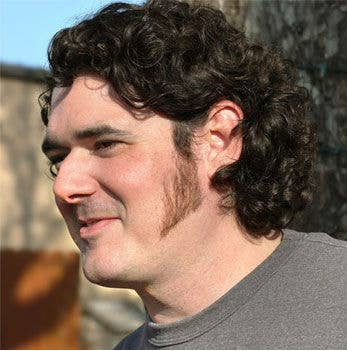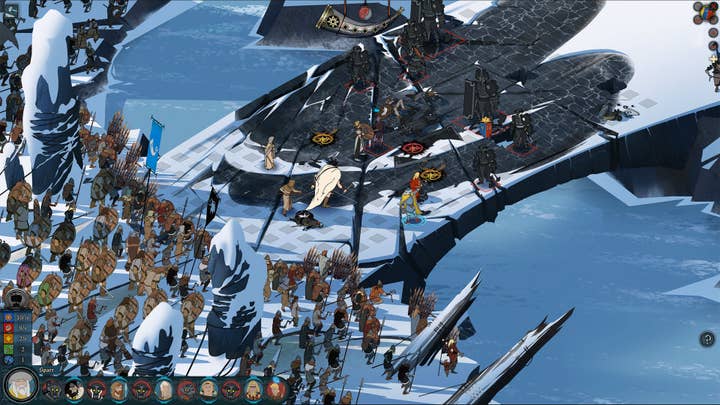“We set out to make this trilogy. We can't leave the story unfinished”
Stoic co-founder John Watson on the dangers of taking your community for granted, and regrouping after The Banner Saga 2's underwhelming launch
Attending a show like Nasscom GDC lends a distinct perspective on success. Developers in India face virtually all of the same challenges as their peers in the US and Europe, but with a sackful more that directly arise from being part of an emerging games industry. Education, funding, publishing, retail; every part of the chain seems a degree - and very often several degrees - more complicated.
As one Nasscom's key international speakers, Stoic founder John Watson has been asked about success by a steady flow of eager Indian developers. The advice he offers is much the same as that with which he and his co-founder Arnie Jorgensen reassured themselves when they decided to leave Bioware to start their own studio. At Bioware, success could mean selling millions of units. As Stoic, success need only mean the ability to make the next game.
"We really neglected our community during the development of Banner Saga 2, because we were focusing on our work. We all agree that was a mistake"
The Banner Saga, Stoic's debut, was supposed to be "a one year game on our own savings," but a breakout Kickstarter campaign forced them to raise their ambitions; Stoic asked the crowd for $100,000, and was duly handed $720,000. "A lot of things worked in our favour, starting with that attention through Kickstarter, which continued through launch," Watson says. "We did a multiplayer demo, Factions, and we maintained our community throughout that time. So when we launched Banner Saga, from day one we had this huge engaged audience."
Looking back now, Watson acknowledges that The Banner Saga's performance on Kickstarter was serendipitous. The middle of 2012 was simply a good time to crowdfund a game, and all the more so if you happened to be leaving one of the biggest names in console development to make a visually stunning passion project. When considering a sequel, most developers would have returned to crowdfunding as their starting point, but Stoic thought differently. Kickstarter is "the cheapest form of money" available to most developers, Watson says, but the attendant difficulties are easy to underestimate.
"We were quite exhausted at the end of The Banner Saga," he continues. "Running a Kickstarter campaign is extremely demanding. There's the setup portion, there's running it for the month, and then for the rest of the development you're supporting that community, answering questions, giving updates. It's a full-time job, and we didn't have anybody dedicated to being that community manager. It was a scary prospect."

Ultimately, Stoic decided on what amounted to an "almost 180-degree turn" for The Banner Saga 2. "Let's just close the doors, close the curtains, spend our own money and do it our own way, without having to answer to anybody. And that's what we did.
"About halfway through, when the money starts getting tight, we started thinking, 'why the hell didn't we get a Kickstarter?'"
The reason might well be success. The Banner Saga raised far more money from Kickstarter than Stoic had expected, and it went on to sell more copies than expected, too. That money could fund what they wanted for The Banner Saga 2, while also being tangible evidence of a community of people who would be interested in playing the next chapter of the story. Stoic decided to focus on making sure that the next chapter was even better.
"I think we dropped the ball there," Watson admits. "We thought that audience would still just be there. We really neglected our community during the development of Banner Saga 2, because we were focusing on our work. I think that was a mistake. We all agree that was a mistake."
The Banner Saga 2 launched for PC in April 2016, and the mistake was immediately clear. In its first few months on Steam, The Banner Saga 2 sold around a third of what The Banner Saga sold over the same period. When GamesIndustry.biz spoke to Versus Evil, Stoic's publisher, last year, Steve Escalante lamented a massive increase in the number of competing titles on The Banner Saga 2's launch week.
"With The Banner Saga we launched against 70 games that month. With The Banner Saga 2 it was over 400, so that is a factor"
"That is a factor," Watson agrees. "With The Banner Saga we launched against 70 games that month. With The Banner Saga 2 it was over 400, so that is a factor. You are fighting more for attention, and it's remarkable how many people I meet say, 'oh, Banner Saga 2 is out?' They just don't know, and we spent a lot of money marketing it. We tried to make it known."
To his credit, Watson swiftly moves the conversation away from factors beyond Stoic's control, seeking instead to identify - and address - its mistakes. As much as anything else, The Banner Saga 2's PC launch demonstrated that retaining a community for a sequel is about more than making an even better game. Stoic now has one person working as a full-time community manager, and that's in a team of just six people.
Indeed, Stoic is looking even deeper than that to ensure its future stability. The team could see that up to 75% of new players who started The Banner Saga 2 on a given week were importing a save from the first game, and The Banner Saga had "a significant flaw" that had gone unaddressed at the time of the sequel's launch. There was, Watson says, "an absurdly steep difficulty curve" for its final boss battle, a consequence of Stoic angling for climactic challenge and tipping the balance too far. Only half of players who reached that fight persevered, leaving the other half with a sour final impression.
"If they finish that battle they are minutes from finishing the game," he says. "It's fucking tragic. They're so close."
According to Watson, 1,000 new people play the first game every single day, and "the funnel" from there into the sequel is clearly observable in Stoic's data. "Seeing this funnel from The Banner Saga really woke us up to the necessity of getting people through the first game," he says. "We've actually spent the last few weeks working on an update to The Banner Saga that basically tunes that battle, so that people can get through."

This kind of thinking is integral to Stoic's strategy in the fallout from The Banner Saga 2's underwhelming early performance. In addition to smoothing the path between the two games, it has translated the sequel into six languages and launched on iOS, Android, PlayStation 4 and Xbox One. The Banner Saga 2 actually launched on Xbox as part of Games With Gold, where it was downloaded more than 1.6 million times. Stoic only received a flat fee for all of those downloads, Watson admits, but the studio is now more focused on the whole franchise rather than an individual game.
"Those things help, and then the launch of The Banner Saga 2 drove sales of Banner Saga. If you look at The Banner Saga as a franchise - all the platforms and both the games - it's generating about the same revenue... It's like building a wedge. Banner Saga 3 might sell a third of what Banner Saga 2 did, but it should lift up the other games. That's what we're betting on."
"Banner Saga 3 might sell a third of what Banner Saga 2 did, but it should lift up the other games. That's what we're betting on"
With The Banner Saga 3, the final game in a planned trilogy, the discussion around funding it was more difficult. "Arnie [Jorgensen] and I... all of our personal fortunes, all of our finances, are buried in The Banner Saga," Watson says. "We've been doing this for four years, we spent all of our retirement money, and we haven't replenished that yet. We both have kids, they have to go to college, and we can't just keep betting it all every time, because making entertainment is the riskiest thing."
It is still too early to seriously contemplate a return to crowdfunding, but Stoic's projected budget is likely greater than the sum they could reasonably expect to raise through Kickstarter - it isn't 2012 any more. Watson admits that he and Jorgensen seriously discussed seeking private investment, and even "shopped around" for options.
"That would have worked, but you're paying back quite a bit. The Banner Saga 3 is probably gonna cost about $2 million to make - that's a lot. So maybe we could get $500,000, but when you get investment you're basically paying it back 3x... That means when we sell The Banner Saga 3 $1 million of extra money goes away [to the investors], as well as giving back the $500k. That would take the pressure off us for sure, a little bit. We would each de-leverage ourselves by $250,000, but when the game ships we're paying back an extra $1 million.
"Is taking investor money gonna make the game sell? Is it gonna make it $1 million more profitable? No. It'll make it a little bit better; we could spend some of that money maybe doing some more animations, maybe we increase the quality level a little bit. The quality has to reach a certain bar for people to accept it as a sequel, because we set that bar for ourselves. But beyond that it won't really affect the profitability. It would be a vanity thing. We just want to make it better."
When Stoic is finished with The Banner Saga, when it is making an entirely new project from scratch, investment of that kind would make a great deal of sense. For The Banner Saga 3, though, taking an investor's money would be "kinda stupid" - a little peace of mind in the here and now in exchange for a lot more potential problems further down the road. Stoic is betting on The Banner Saga as a franchise, and once again it will make that bet with its own money.
"We have to do it," Watson says. "We set out to make this trilogy. We can't leave the story unfinished."
